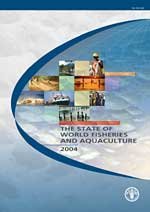Rebuilding depleted wild fish stocks is a "challenging necessity" says the newest edition of FAO's biennial report, The State of World Fisheries and Aquaculture (SOFIA), released today.
According to FAO, there has been a consistent downward trend since the 1950s in the proportion of marine fish stocks with potential for expanded production, coupled with an increase in the proportion classified as overexploited or depleted.
Currently, SOFIA reports, three percent of marine stocks are underexploited, while 21 percent are moderately exploited and could support modest increases in fishing and in harvests.
52% are fully exploited, which means they are being fished at their maximum biological productivity. Increased fishing of these stocks would not produce any additional sustainable harvests and would reduce reproduction to dangerously low levels.
The remaining twenty-four percent are over exploited (16%), depleted (7%), or recovering from depletion (1%) and need rebuilding. Some of these stocks are already under strict management schemes.
Seven of the top ten marine fish species -- which together account for about 30 percent of all capture fisheries production -- are fully exploited or overexploited, today's report said. This means that major increases in catches cannot be expected from them, and serious biological and economic drawbacks are likely if fishing capacity for these stocks is further increased.
Regions with fish stocks in greatest need of recovery include the Northeast Atlantic, the Mediterranean Sea and the Black Sea, followed by the Northwest Atlantic, the Southeast Atlantic, the Southeast Pacific and the Southern Ocean.
Restoring stocks a high-order challenge
"Stock depletion has implications for food security and economic development, reduces social welfare in countries around the world, and undermines the well-being of underwater ecosystems," said Ichiro Nomura, FAO Assistant Director General for Fisheries.
"While recovery of depleted stocks urgent, it is just as important to avoid depleting still-healthy stocks in the first place by matching fishing efforts to what these stocks are capable of supporting," he added.
Strategies for rebuilding stocks identified in today's report include significantly decreasing or temporarily stopping fishing in overexploited fisheries, reducing degradation of underwater environments and actively rehabilitating damaged habitats.
Considering the limited progress achieved in the last decade in this respect, restoring depleted stocks to healthy biomass levels by 2015, a goal set at the 2002 World Summit on Sustainable Development, represents "a high- order" challenge, according to SOFIA.
Despite challenges, a new high in production -- with aquaculture playing key role
Despite these challenges, global fish production reached a new high of 133 million tons in 2002, largely as a result of expanded production on fish farms, SOFIA notes.
The share of world fisheries production attributable to aquaculture increased from 25.8 to 29.9 percent between 1998 and 2002. During the same period, production from capture fisheries grew by 6.3 percent while aquaculture production increased by 30 percent. Most of the growth in capture fisheries occurred between 1998 and 1999. Since 2000, capture production has remained generally stable.
Human consumption of fish increased from 93.6 million tons in 1998 to 100.7 in 2002, providing 2.6 billion people with at least 20 percent of their average per capita animal protein intake.
Demand for fish will continue to rise
Total world consumption of fish (food and feed) could increase to 179 million tons by 2015, up 47 million tons from 2002. Most of that new demand will have to be met by aquaculture, which could account for 39 percent of all fish production in 2015.
But growth in aquaculture will not make improvements in current fishing practices and management any less important.
"In light of current trends, the continued improvement of management of wild fish stocks is essential," cautioned Mr. Nomura. "Aquaculture may help reduce pressure on capture fisheries by reducing demand for wild fish and lowering prices, but that's only part of the solution."
He added that signs of progress in some countries show that improvement is possible.
A vision of sustainable fisheries
Mr. Nomura also noted that 2005 marks the 10th anniversary of the adoption of the FAO Code of Conduct for Responsible Fisheries, a non-binding instrument that provides a blueprint for responsible fishing practices.
All 188 FAO Member states have committed to use the Code to strengthen their own fishing policies and improve international cooperation on fishing management.
"Over the last ten years we have seen countries and regional fisheries bodies around the world draw on the Code to improve fisheries management," he said. "Much progress has been made, but more still needs to be done during the next ten years. Ultimately, the only real tangible sign of success will be the clear reversal in the resource trends and related improvements in the situation of fishers."
Starting today, representatives of nearly 50 countries are gathering at FAO's Rome headquarters for the 26th meeting of the FAO Committee on Fisheries (COFI), where they will discuss the issues raised in SOFIA.














